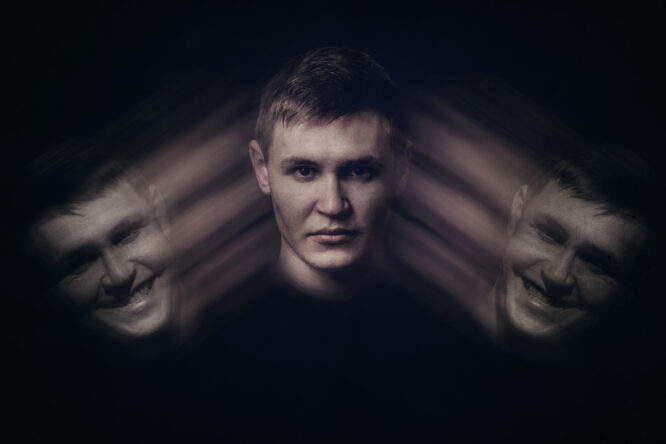Most of us get a gut feeling when something feels off about someone, but it’s not always easy to pin down why.

Sometimes, it’s not what they say at all—it’s how they carry themselves, how they move, or how their energy fills a space. While no single behaviour confirms anything clinical, certain non-verbal patterns can hint at deeper traits that lean towards narcissism or even psychopathy. Here are some major body language cues that might raise a red flag, especially if you notice more than one.
1. They hold extended eye contact that feels more like a challenge than interest.
 Source: Unsplash
Source: Unsplash Most people break eye contact naturally to signal comfort and mutual respect. However, someone with narcissistic or psychopathic tendencies might stare longer than usual, using eye contact more like a control tactic. It can feel less like connection and more like a silent power move.
This isn’t the warm, engaged kind of eye contact—it’s the intense, unblinking kind that makes you feel like you’re being examined or even dominated. It’s not always obvious at first, but your discomfort might be the clue.
2. Their smile doesn’t reach their eyes.

You know that tight-lipped smile that feels more rehearsed than real? That’s often a giveaway. With narcissistic or psychopathic traits, emotional mimicry is common—they’ll offer the socially expected reaction, but it lacks genuine warmth. It’s the kind of smile that’s there because it should be, not because they feel it. As time goes on, you’ll notice it never quite softens their expression or matches the energy of the situation, especially in more vulnerable or emotional settings.
3. They lean in aggressively rather than conversationally.

Getting close can feel friendly, but when it’s forced, fast, or exaggerated, it can signal control. Narcissists and psychopaths often ignore subtle social cues around space. They might lean in just a bit too much, too soon, and it throws people off without knowing why. That behaviour isn’t closeness. It’s their way of testing boundaries and seeing if you’ll pull back. If you don’t, they might take it as a green light to keep pushing your comfort zone.
4. Their expressions switch off too quickly.

Most people’s facial expressions fade naturally, especially if they’re reacting emotionally. But someone who’s putting on a show might flash a grin or a look of concern—and then drop it the second they think you’ve seen it. That fast switch from emotion to blank can feel unsettling, especially if it happens more than once. It suggests the emotion wasn’t felt—it was performed for effect.
5. They dominate physical space, even when it’s shared.

Watch how they sit or stand in group settings. Someone with narcissistic traits might sprawl, take up space, or stand in doorways without awareness—or concern—for other people trying to get by. Posturing like that is often subconscious, but it gives insight into how they see themselves in relation to other people: central, more important, and less obligated to adapt or make room.
6. Their gestures are exaggerated and theatrical.

There’s a difference between expressive and performative. If someone’s hand movements, nods, or laughs seem overdone—like they’re acting out a scene—it can be a sign that they’re more concerned with how they’re being perceived than what they’re actually saying. These gestures aren’t about connection—they’re about manipulation. It can feel like they’re trying to charm the room, not engage with it honestly.
7. They ignore mirroring cues.

In natural conversation, people tend to mirror each other’s posture and pace. However, narcissists or psychopaths might not mirror at all, or they might force it in a way that feels off because they’re trying to manipulate the connection rather than build it. Either they seem disconnected from your rhythm, or they mimic you in a way that feels like a performance. Both can be unnerving and give away that something isn’t quite right underneath the charm.
8. They touch other people too often or too deliberately.

Some people are naturally tactile, but when it feels calculated—like touching your arm every few minutes or brushing past too often—it can be a control tactic. It’s subtle, but it overrides your personal boundaries without giving you space to react. That physical imposition is often framed as friendliness, but if it makes you tense or surprised, pay attention. It’s not just the touch—it’s the motive behind it that matters.
9. They smile or laugh at moments that don’t fit.

Emotional mismatch is a big giveaway. If someone laughs at something serious, or smirks during someone else’s discomfort, it shows a lack of empathy, and a disconnect from shared emotional experience. These aren’t harmless quirks—they’re often signs that someone either doesn’t register emotional tone correctly, or doesn’t care to. Either way, it’s worth noting.
10. They stay completely still when most people would react.
 Source: Unsplash
Source: Unsplash In normal conversation, people fidget, blink, shift, and respond physically. Someone who stays oddly still, especially during high-emotion conversations, can come across as emotionally removed or performative. Such controlled stillness can be a sign they’re managing their image more than they’re genuinely engaging. It’s eerie, especially when paired with other cues on this list.
11. Their walk is overly confident or slow in a way that feels unnatural.

Walking tells you more than you’d think. A strut, a swagger, or a heavy, calculated pace can suggest they’re putting on a show, especially if it doesn’t match the situation. Confidence is great, but when it feels performative or intimidating, it often hints at an inflated sense of self or a need to be seen as superior.
12. They don’t show tension where most people would.

In awkward or tense moments, most people show signs of discomfort—shifting, blinking, swallowing. If someone seems completely unaffected by social pressure or emotional weight, it might not be emotional regulation—it might be detachment. That lack of reaction might look like cool confidence, but in some cases, it can reflect a deeper disconnection from typical emotional responses.
13. They use silence to control, not connect.

Pauses in conversation are normal—but someone with controlling tendencies might let silence stretch just a little too long to create tension. It’s less about thinking and more about watching how you’ll squirm to fill the space. That kind of silence isn’t shared. It’s a tactic, and you’ll usually feel it in your body before your brain catches up. It can make you second-guess yourself even though nothing was said.
14. Their posture stays in “performance mode” too long.

Good posture is fine. But someone who holds a chest-out, chin-up, overly rigid stance constantly, even in casual moments, might be more invested in image than comfort. It gives off a strange intensity that doesn’t relax, even when everyone else does. If you feel like someone’s constantly “on,” even when there’s no audience, that posture might be part of how they protect a carefully curated persona.




